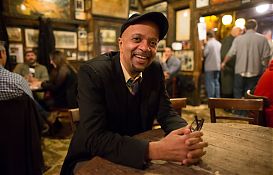Traveling With John Brown Along the Road to Literary Celebrity
By JULIE BOSMAN
James McBride was so sure that his novel “The Good Lord Bird” was not going to win the National Book Award that in the final moments before the prize was announced last Wednesday at a black-tie dinner in Manhattan, he barely looked up from his plate of apple mille-feuille.
“I was stuffing that down my gullet,” Mr. McBride said on Friday, recalling the moment when his name was called. “I was so stunned that I walked up there with my napkin in my hand.”
Accepting the award in his tuxedo and black porkpie hat, Mr. McBride confessed to the audience of 700 publishing industry types that he had neglected to write a speech. “I was just trying to get through it,” Mr. McBride, one of five finalists for the award, said later.
“The Good Lord Bird,” a 417-page novel that manages to be rooted in the true story of slavery and darkly funny, was hardly an unnoticed book this year. In August, it was prominently displayed on the cover of The New York Times Book Review, where Baz Dreisinger praised Mr. McBride for writing “masterfully, like a modern-day Mark Twain: evoking sheer glee with every page.” In The Washington Post, Marie Arana called it a “boisterous, highly entertaining, altogether original novel.”
Yet it gave the publishing world a jolt last week when Mr. McBride swept aside competitors with better-known boldface names — Thomas Pynchon, George Saunders, Jhumpa Lahiri and Rachel Kushner — and was instantly elevated to a level of literary celebrity that he has yet to enjoy throughout a long career that has produced a critically acclaimed memoir of his biracial childhood and two novels (along with years of articles from his early days as a newspaperman for The News Journal in Wilmington, Del., and The Boston Globe).
Over scrambled eggs, toast and coffee on Friday morning at a diner near New York University, where he has been a distinguished writer in residence for the last seven years, Mr. McBride was still shaking his head at his prize. He is an elegant, easygoing 56-year-old who looked impeccably unruffled and dry in a tie, black blazer and pale gold hoop in his left ear, despite having just ridden his bicycle through the rain.
In the last 36 hours, Mr. McBride said, he had received congratulatory emails from at least 150 people. Text messages were flooding his cellphone. The National Book Foundation, which administered the prize, has promised a $10,000 check and a bronze statue.
“This is a very good problem to have,” he said of his sudden fame. “I wish my mother were alive to see it.”
Mr. McBride, a lifelong musician, grew up in Brooklyn and Queens, studied at Oberlin and went on to the Columbia School of Journalism.
It was there that he discovered he had a talent for writing fiction. Quietly, he began creating short stories and eventually sold a memoir, “The Color of Water,” about his childhood. (Handed the first installment of his $40,000 advance, Mr. McBride recalled, “I felt like Rupert Murdoch.”)
Mr. McBride has always been a low-key presence in a city that dotes on its famous authors. He never reads his reviews, even those that his friends tell him he really should read. “I’m just too sensitive,” he said. He keeps a small studio in Hell’s Kitchen, but most of the time lives in Lambertville, N.J., in a rowhouse two blocks from the river, with his cat, Minou. (Mr. McBride and his ex-wife share custody of their 12-year-old son, Nash; their two other children are in college: Jordan at Oberlin and Azure at the Pratt Institute.)
The idea for “The Good Lord Bird” first developed around 2009, when Mr. McBride was conducting research at a historical society in Maryland. There, he became engrossed in the story of John Brown, the white abolitionist who led an ill-fated raid on the federal armory at Harpers Ferry, Va., an event that is often cited as the catalyst for the Civil War.
“I couldn’t believe how delicious it was,” Mr. McBride said of the story, which he quickly realized had been told in dozens of books. “I just wanted to find a way to do him differently.”
Mr. McBride, who was raised in a churchgoing household, was fascinated by the firmness of Brown’s religious beliefs. In the course of his research, he visited Harpers Ferry more than a dozen times and read 30 to 50 books on Brown.
His own novel took a comedic tack, beginning with a narrator, Henry Shackleford, a young escaped slave who is mistaken for a girl by Brown, who makes it his mission to lead Shackleford to freedom.
Whether it was possible to write a funny novel about slavery barely gave Mr. McBride pause. He was sure he was onto the right thing. “I knew what the melody of the song was going to be,” he said. “It was a little improvisatory.”
The National Book Foundation judges described “The Good Lord Bird,” published by Riverhead Books, as “daringly irreverent, but also wise, funny and affecting.”
Mr. McBride said: “It’s just one of those things. I was just standing in the right place when the Lord coughed.”
.
.
.
.
.
….
.
.
.
.
.
.
..
